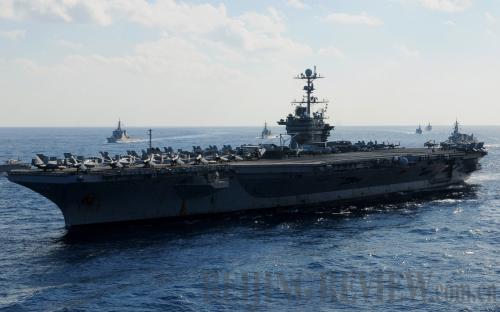|
 |
|
MILITARY SHIFT: The aircraft carrier USS George Washington in the Philippine Sea in December 2011, during a bilateral exercise designed to strengthen maritime capabilities between the United States and Japan (CFP) |
During Senate deliberations on whether to consent to the ratification of the 1971 Okinawa Reversion Treaty, the U.S. State Department asserted that Washington took a neutral position on the competing claims of China and Japan over the Diaoyu Islands.
The treaty, under which the United States transferred the islands to Japanese administration, "does not affect the legal status of those islands at all," said the report, published on September 25 by the U.S. Congressional Research Service.
"Department officials asserted that reversion of administrative rights to Japan did not prejudice any claims to the islands," it said. Successive U.S. administrations have restated this position of neutrality, it added.
Chinese Foreign Ministry spokesman Hong Lei responded to the report by saying that he noted the United States' neutral position on the Diaoyu Islands and hoped Washington will "walk the talk."
When meeting reporters in early October, former U.S. Secretary of State Henry Kissinger, who was deeply involved in the establishment of Sino-U.S. diplomatic relations and the handover of Okinawa to Japan in the 1970s, said ownership of the Japanese-controlled Diaoyu Islands remain a bilateral matter between Tokyo and Beijing, citing a past agreement between Japan and the late Chinese leader Deng Xiaoping.
Kissinger said there was "no active American involvement" in formulating a conclusion that was reached between Tokyo and Beijing on the islets in the East China Sea.
Observers say it is clear that Washington has never recognized Tokyo's sovereignty over the Diaoyu Islands. However, though the United States has reiterated time and again that it takes no position on the territorial row between China and Japan, it supports Tokyo with the 1960 U.S.-Japan Security Treaty. Its recent military moves have also aroused concern.
The United States insists the Diaoyu Islands fall under the scope of the U.S.-Japan Security Treaty, which stipulates that the United States is bound to protect "the territories under the administration of Japan."
Tao Wenzhao, a senior researcher with the Institute of American Studies at the Chinese Academy of Social Sciences, said Washington's attitude is ambiguous and self-contradictory.
Washington said it remains neutral on the issue, but claims the U.S.-Japan Security Treaty applies to the Diaoyu Islands. However, Washington said the treaty does not apply to the "Northern Territories," the four Russian-held islands off Hokkaido that the United States claims belong to Japan, Tao said.
At a time when China and Japan were embroiled in an escalating dispute over the Diaoyu Islands, the United States recently sent the USS George Washington and USS John C. Stennis aircraft carriers to the West Pacific region.
Though Washington said the deployment was part of efforts to help maintain regional peace and stability, Japanese media is reporting that the move was a signal of Washington's backing of Tokyo.
Jin Canrong, Associate Dean of the School of International Studies at Renmin University of China, said Washington is taking advantage of the dispute between China and Japan to drag Tokyo closer to Washington. It would stand in line with Tokyo over the Diaoyu Islands issue, but it would also keep a certain distance.
Washington wants China and Japan to keep a certain amount of tension, but it doesn't want the tension to escalate to conflict, lest it should be dragged into conflict, Jin added.
Tao said the moves by the United States exemplify its strategic shift to the Asia-Pacific region. Washington doesn't want a head-on collision with China over the Diaoyu Islands issue because the United States and China currently enjoy a close relationship and share many common interests, he said.
| 